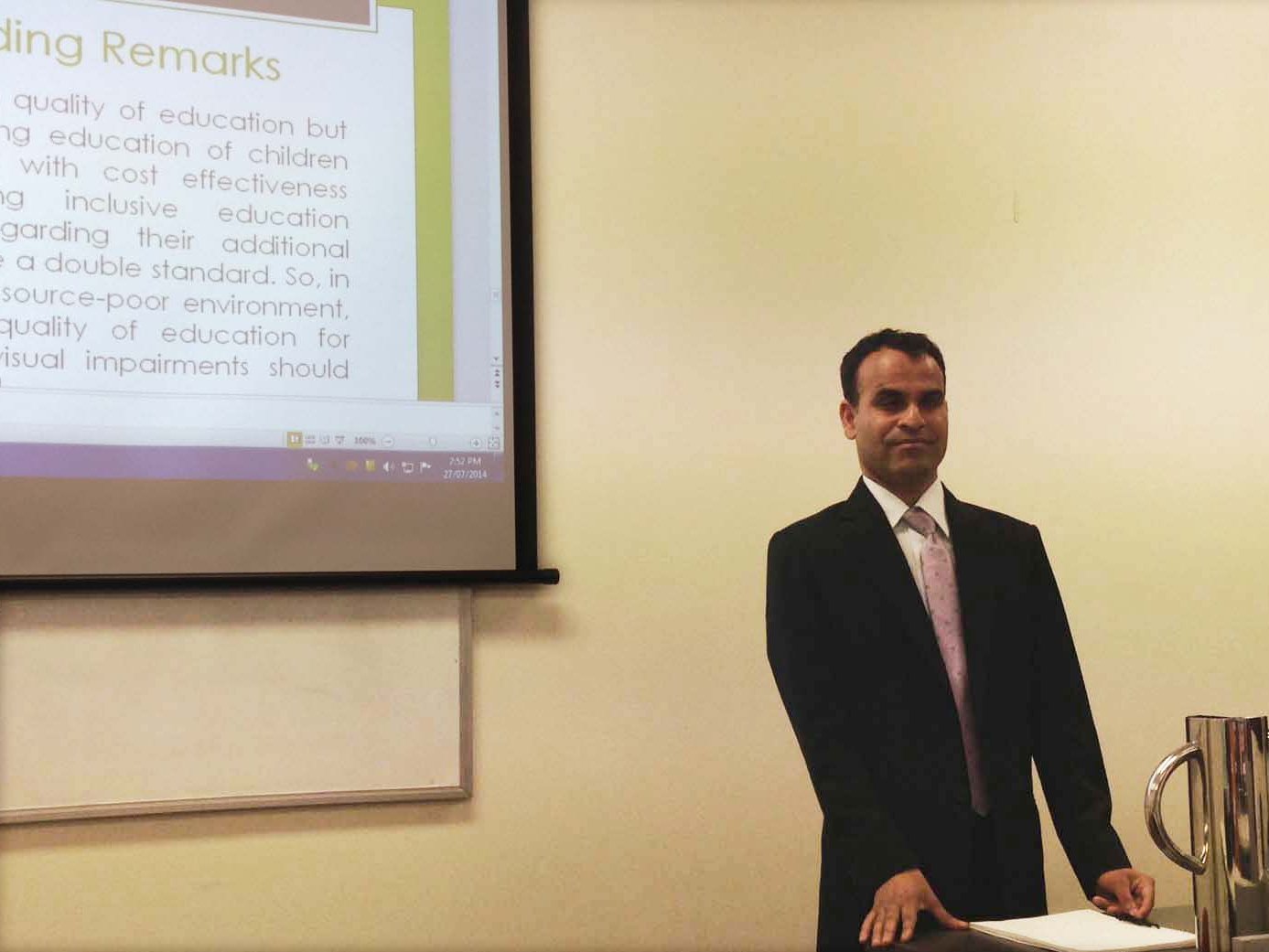Accurate and Disaggregated Disability Data and Statistics are Crucial for SDGs: JICA-RI Research Fellow Recommends at UN Expert Group Meeting
2014.08.12
With the target year 2015 to achieve the United Nations Millennium Development Goals (MDGs) approaching, active discussions on the development agenda for post-2015 are ongoing.
In the course of finalizing goals for post-2015, an expert group meeting (EGM) was held under the theme of “Disability data and statistics, monitoring and evaluation: the way forward, a disability inclusive development agenda towards 2015 and beyond” at the United Nations Educational, Scientific and Cultural Organization (UNESCO) Headquarters in Paris from July 8-10. The meeting was co-organized by the UNESCO and the United Nations Department of Economics and Social Affairs (UNDESA). The EGM discussed the current status of disability statistics and suggested some recommendations to strengthen data collection. The EGM also discussed on how disability can be included in the targets and indicators being developed for the Sustainable Development Goals (SDGs).

Research Fellow Lamichhane
Including JICA-RI research fellow Kamal Lamichhane, approximately 25 experts working on disability research participated in the EGM. Besides other research projects, Lamichhane also involves as one of the members in Evidence-based Analysis for Post-2015 Development Strategies at JICA-RI.
In his concept note submitted prior to the EGM, Lamichhane highlights the importance of establishing system for collecting, managing, and monitoring data and statistics on disability in achieving disability-inclusive development goals. Despite the fact that about 80 per cent of the world’s population of people with disabilities lives in developing countries, studies on their necessary conditions to improve the quality of life are limited. Furthermore, those with disabilities remain trapped in the poverty cycle as a result of lack of effective policies and programs to develop their human capital and to increase their access to basic facilities. In light of these situations, he suggests that comprehensive social inclusion requires multifaceted efforts and policies with greater investment in addition to a change in social attitudes on disability.
Lamichhane also points out that the dearth of reliable data and empirical research accounts for why disability issues have a low priority in the development agenda within policies of governments and international agencies. He, therefore, emphasizes the need to expand the collecting, managing, and monitoring of disability data. As the UN Convention on the Rights of Persons with Disabilities (CRPD) also emphasize the importance of data and statistics, it is crucial that researchers, academic institutions and governments work jointly and innovatively beyond disciplines and geographical boundaries.
The EGM also stressed the need to incorporate disabilities in all the surveys conducted in national level with internationally acceptable questionnaires so that such data can be compared, disaggregated by disability status. The proposed recommendations and consensus from the EGM will be submitted at the UN General Assembly to be held in September 2014, and are expected to contribute to the discussions towards finalizing SDGs.
After attending the EGM, Lamichhane participated in the Disability Studies in Education (DSE) conference held at Victoria University in Melbourne, Australia on July 25-27. Nearly 115 papers were presented in the conference, covering a wide range of topics in disability research and education.
Introducing a case from Nepal, Lamichhane spoke on the topic: “Teaching style consideration of teachers for students with visual impairment in mainstream classes.” His empirical research focuses on what particular factors play a crucial role in changing the teaching style adjustment decision of mainstream school teachers while teaching students with visual impairments in the same mainstream classes. He stressed the importance of incorporating disability specific components in general training programs for teachers in order to meet the learning needs of students with visual impairments who study with their peers without disabilities.

事業事前評価表(地球規模課題対応国際科学技術協力(SATREPS)).国際協力機構 地球環境部 . 防災第一チーム. 1.案件名.国 名: フィリピン共和国.

事業事前評価表(地球規模課題対応国際科学技術協力(SATREPS)).国際協力機構 地球環境部 . 防災第一チーム. 1.案件名.国 名: フィリピン共和国.

事業事前評価表(地球規模課題対応国際科学技術協力(SATREPS)).国際協力機構 地球環境部 . 防災第一チーム. 1.案件名.国 名: フィリピン共和国.

事業事前評価表(地球規模課題対応国際科学技術協力(SATREPS)).国際協力機構 地球環境部 . 防災第一チーム. 1.案件名.国 名: フィリピン共和国.

事業事前評価表(地球規模課題対応国際科学技術協力(SATREPS)).国際協力機構 地球環境部 . 防災第一チーム. 1.案件名.国 名: フィリピン共和国.
scroll